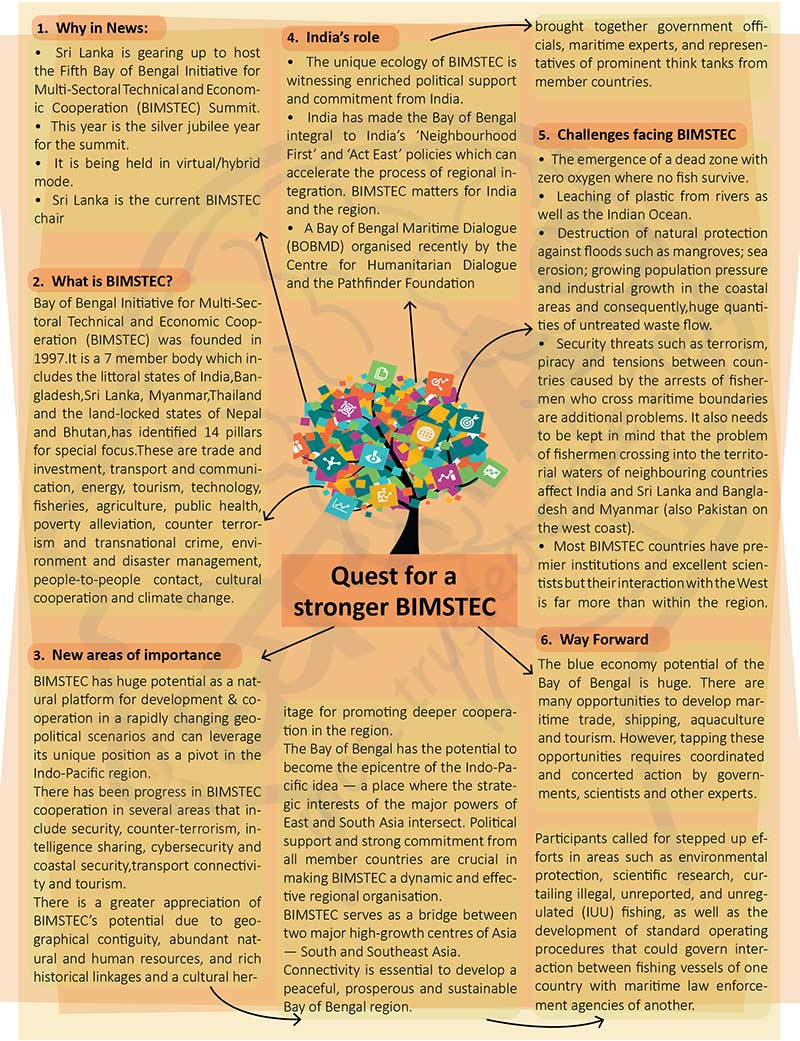Brain-booster /
27 Apr 2022
Brain Booster for UPSC & State PCS Examination (Topic: Quest for a stronger BIMSTEC)

Why in News?
- Sri Lanka is gearing up to host the Fifth Bay of Bengal Initiative for
Multi-Sectoral Technical and Economic Cooperation (BIMSTEC) Summit.
- This year is the silver jubilee year for the summit.
- It is being held in virtual/hybrid mode.
- Sri Lanka is the current BIMSTEC chair
What is BIMSTEC?
- Bay of Bengal Initiative for Multi-Sectoral Technical and Economic
Cooperation (BIMSTEC) was founded in 1997.It is a 7 member body which
includes the littoral states of India,Bangladesh, Sri Lanka,
Myanmar,Thailand and the land-locked states of Nepal and Bhutan,has
identified 14 pillars for special focus.These are trade and investment,
transport and communication, energy, tourism, technology, fisheries,
agriculture, public health, poverty alleviation, counter terrorism and
transnational crime, environment and disaster management, people-to-people
contact, cultural cooperation and climate change.
New areas of importance
- BIMSTEC has huge potential as a natural platform for development &
cooperation in a rapidly changing geopolitical scenarios and can leverage
its unique position as a pivot in the Indo-Pacific region.
- There has been progress in BIMSTEC cooperation in several areas that
include security, counter-terrorism, intelligence sharing, cybersecurity and
coastal security,transport connectivity and tourism.
- There is a greater appreciation of BIMSTEC’s potential due to
geographical contiguity, abundant natural and human resources, and rich
historical linkages and a cultural heritage for promoting deeper cooperation
in the region.
- The Bay of Bengal has the potential to become the epicentre of the
Indo-Pacific idea — a place where the strategic interests of the major
powers of East and South Asia intersect. Political support and strong
commitment from all member countries are crucial in making BIMSTEC a dynamic
and effective regional organisation.
- BIMSTEC serves as a bridge between two major high-growth centres of Asia
— South and Southeast Asia. Connectivity is essential to develop a peaceful,
prosperous and sustainable Bay of Bengal region.
- Participants called for stepped up efforts in areas such as
environmental protection, scientific research, curtailing illegal,
unreported, and unregulated (IUU) fishing, as well as the development of
standard operating procedures that could govern interaction between fishing
vessels of one country with maritime law enforcement agencies of another.
India’s role
- The unique ecology of BIMSTEC is witnessing enriched political support
and commitment from India.
- India has made the Bay of Bengal integral to India’s ‘Neighbourhood
First’ and ‘Act East’ policies which can accelerate the process of regional
integration. BIMSTEC matters for India and the region.
- A Bay of Bengal Maritime Dialogue (BOBMD) organised recently by the
Centre for Humanitarian Dialogue and the Pathfinder Foundation brought
together government officials, maritime experts, and representatives of
prominent think tanks from member countries.
Challenges facing BIMSTEC
- The emergence of a dead zone with zero oxygen where no fish survive.
- Leaching of plastic from rivers as well as the Indian Ocean.
- Destruction of natural protection against floods such as mangroves; sea
erosion; growing population pressure and industrial growth in the coastal
areas and consequently,huge quantities of untreated waste flow.
- Security threats such as terrorism, piracy and tensions between
countries caused by the arrests of fishermen who cross maritime boundaries
are additional problems. It also needs to be kept in mind that the problem
of fishermen crossing into the territorial waters of neighbouring countries
affect India and Sri Lanka and Bangladesh and Myanmar (also Pakistan on the
west coast).
- Most BIMSTEC countries have premier institutions and excellent
scientists but their interaction with the West is far more than within the
region.
Way Forward
- The blue economy potential of the Bay of Bengal is huge. There are many
opportunities to develop maritime trade, shipping, aquaculture and tourism.
However, tapping these opportunities requires coordinated and concerted
action by governments, scientists and other experts.









